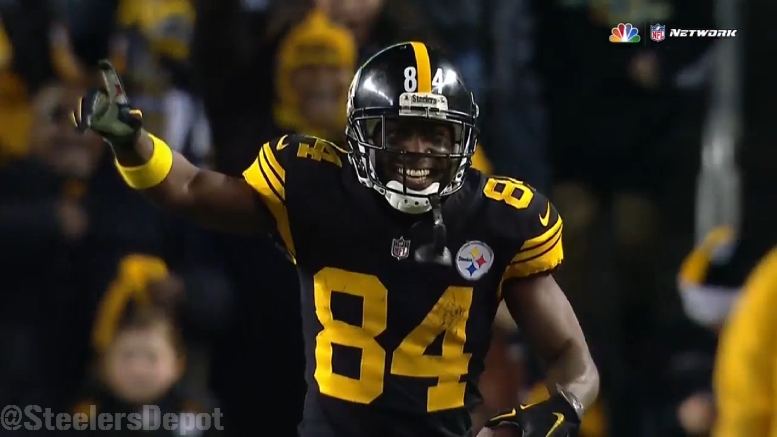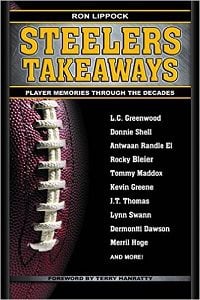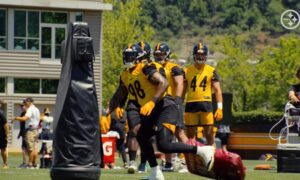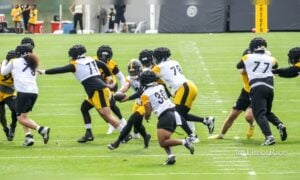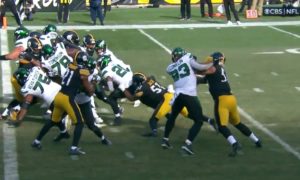Bringing you another Pittsburgh Steelers’ interview courtesy of our good friend Ron Lippock of the Pittsburgh Sports Daily Bulletin. Really fun interview today with former wide receivers coach Scottie Montgomery, who coached with the team from 2010 through 2012. They talk about the draft process, why he liked Antonio Brown coming out of the draft, and the close relationship the entire coaching staff had.
Be sure to check out Ron’s book, Steelers’ Takeaways: Player Memories Through The Decades, featuring over 400 interviews with players and coaches, past and present. You can buy it on Amazon through the link provided here.
First, can you talk a bit about how being a successful undrafted free agent impacted your approach as a coach?
The biggest deal really of being an undrafted free agent is that people look at it as a terribly hard road to make it in the NFL. But it gives you the mindset to accomplish big things. The biggest thing for me was needing to understand the details quickly – the schematics in coaching. As an undrafted free agent I had to quickly learn all the wide receiver positions – the X, Z, slot…whatever they call it depending on the team.
The details that also come with learning the run game and everything else. Just gaining the knowledge of the game. I constantly was learning the game and seeking information. That’s because as an undrafted free agent you have the humility – you’re humble. And the veterans like that and will help you any way the can because of that humility. That helps me now as a coach – it’s the same deal. I always try to learn the details and be humble enough to ask questions and learn the work as humbly as possible.
How have you found coaching in college compares with coaching in the NFL? Is it tougher?
In the NFL the only option is to play as hard as you can. Everyone really is on a one-day contract. In college, the kids have more excuses to fall behind. It’s much harder as a coach. The adjustment was tougher for me – the kids’ need to focus on their education and dealing with donors and alumni that try to impact their experiences. There are more distractions for the kids.
The recruiting was new to me but that is a lot of fun. I’m a people person. Not in a judgmental way, but I like watching the kids at school and at home to see if they’re are a good fit for the school and the program. It’s rewarding. But yeah, in college, everyone’s number one goal is not always to be the best player all the time, like it is in the NFL.
Who were some of the coaches who impacted your coaching style now, and how?
Alex Gibbs. He coached us so hard in the running game in Denver. Coach Kubiak, his work with the run-action pass game. Their ability to teach that helped me. Mike Shanahan – his ability to oversee the work – the level needing to be maintained every day. He was hands on everything and I respected his personal relationships with players. He was close enough to tell players the truth, which not all coaches do. There were no surprises when a player was cut or demoted.
After that, Tomlin, and through him Tony Dungy. the way those guys lead and communicate with players. And schematically, [David] Cutcliffe and Bruce Arians. Bruce took me everywhere with him – he taught me how to coordinate the week and how to script practices. I give him a lot of credit for that.
In Pittsburgh, you had such success with the wide receiver group – most of which weren’t high picks. How were you able to find that success – what’s that “secret sauce?”
It really goes to what I really like about the Steelers. It’s a tight-knit organization – information doesn’t get leaked. I could go to a workout, write it up, send it to Mike Tomlin and Kevin Colbert and no one writes about it. That’s so important. We had a certain grading system in place for a long time – I can’t tell you of course what that is.
But we only had certain people evaluate certain things. The grades only came from people who had direct contact with the draftees. There was a lot of emphasis on production – less on potential. We valued production over potential and certain criteria in a position.
There are a lot of teams who have tried to get me to talk about the details of course. But we had only a small circle involved in any debates about players – only ones that were directly involved in the actual player’s scouting. So the debates were valuable and you were able to make decisions.
How involved were you in the drafting process?
As soon as the Super Bowl was over, really even before then, I was already working on the draft class. What you do – the scouting department gives you a list of guys for your position – maybe 40-90 guys. I would look at four-to-five game films and put together a highlights and lowlights film and do my write-up for each with my grade. I’d bring it back to the scouting department with my grade.
The offensive coordinator does the same as well as the scouts and Tomlin too. Of course Mike’s grade was the most important! But we put them all together and we’d meet on them to discuss them. In Pittsburgh, no one has a made mind. That’s so important too. The information we receive on a player after our grades can drop a guy. You have to have the humility to say “I was wrong” about a guy after their workouts or other information comes in.
It was always need connected to the best player available. I liked Antonio Brown really high in the draft. Mike and Kevin though knew to take Emmanuel Sanders much earlier – in the third round. They felt Antonio could be had later. My feelings were hurt – I wanted AB higher – but finally Mike came into my office in the sixth round and told me to stop moping, that we could take him now. They knew better. I had to have the humility to know they knew better than to take him as high as I wanted too.
The ability at the end to pit Antonio and Emmanuel against each other, to see their competitive natures was great to see. We had Hines and Mike Wallace there – we knew the makeup of the team. We lost Santonio and wanted guys we could build on.
Tell me one of your favorite moments as a Steeler.
It’s funny but my favorite moment was not on the field. It’s more about family. Mike Tomlin and I, and Randy Fichtner were back in town and it was a down time. We lost to Denver in overtime and Kirby Wilson had that horrific house fire. We were all upset but it was killing Randy – he’d cry about it now and then. Mike always told him he had to be strong before we went in to see Kirby at the hospital.
Well after two months in, I’d try to sneak Kirby chicken wings – he loved those hot wings – hoping he’d be awake. He was finally awake one day and we were talking as he had his eyes open, looking at us. Then he said “What the hell are you assholes looking at?” Right then, we all started hugging each other. Kirby was back. It was one of the most special moments. We were all standing over top of him – we knew then that we were getting Kirby back. We didn’t know if he’d survive. At the same time my mother was dying of cancer. It’s a moment I’ll always cherish.
OK – so I was charged with the task of asking you this. Why the all-black clothes during practices all the time?
Ha – at practice I wore all black, yes. It was a mindset. It truly is. I wanted the guys to know the pride I had in being a Steeler. I always identified with the toughness of the black and gold, all those guys that played before us. I was so tired of guys bellyaching about the heat, so I wore all black, sometimes even sweatpants, to show them I identified with what they were going through and the need for that toughness. That hard-nosed mindset – I just identified with Pittsburgh so much. I wanted them to know that we were all in it together.
So – who surprised you most on the team?
No one really surprised me. I think not being able to keep all of the players shocked me most, maybe. Losing Mike [Wallace] then Emmanuel. I loved seeing them all together. I was hurt and shocked when Mike left.
AB shocked me about how quickly he learned to dominate. He turned into the most dominant figure in the game on the back side. People say I loved Antonio – they used to say he was like my son. I did love Antonio the first time I saw him but I didn’t think he could be that good that fast. The defensive guys used to say I’d do anything for him – cheat for him and script plays in practice to give him an advantage. But the truth is I was surprised at how fast he developed. He learned the playbook – and he was available. He stayed healthy. A lot of that goes into it to becoming that dominant that fast.
What made you so appreciative so early on of Antonio?
I saw him at the combine, followed him some before, watched his tape. I saw his game coming together. When we brought him in he told me he would work harder than anyone and be the best player in the NFL. So at the combine, he just smiled at me and said “I’m ready.” I didn’t even say a word to him. When we drafted him, Mike and Bruce were on me whenever he made an error. They would tell me it was my fault. They wanted to put us together to make sure he did well. We believed in each other.
Any advice for players entering the game today?
Be quiet. Listen. The veterans are veterans for a reason. Next, understand it’s a job. You have to know what you’re doing. The biggest reason people are cut is due to mental errors. It’s not because of physical errors – players at this level aren’t dropping many passes, for example.
The biggest issue is don’t make mental errors. Know the playbook. It’s not about fame or the money – that’s a TV show. That’s not football. Anyone who comes to Pittsburgh – even as an undrafted free agent – you know you have a chance.

